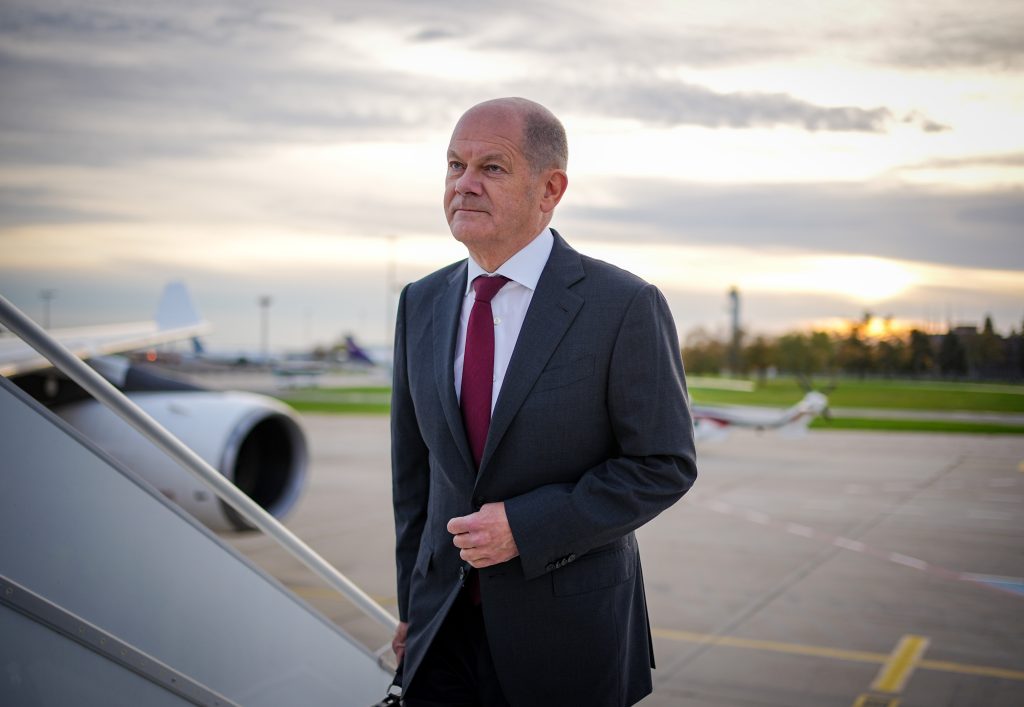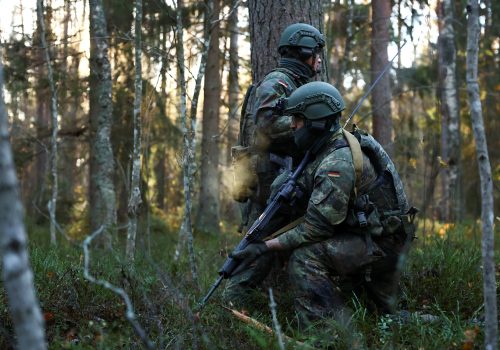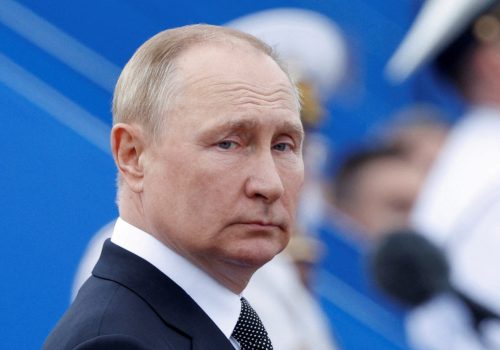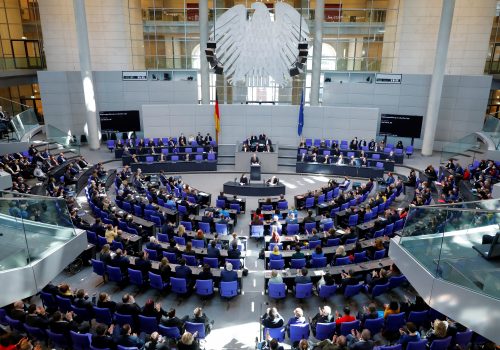The German government is eerily calm as an energy crisis threatens to wreck its economy, allies loudly question its intentions, and war rages on in Ukraine. There’s a palpable sense in Berlin that when it comes to the Zeitenwende—the historic turning point in foreign policy championed by Chancellor Olaf Scholz—Germany has time. After all, according to Wolfgang Schmidt, Scholz’s chief of staff, Germany is still a “teenager” when it comes to its leadership role in Europe and beyond. The world can’t expect Germany to complete a 180-degree shift on foreign and defense policy in a matter of months. But rest assured, its officials maintain, Germany is well on its way to mending its ways—at its own pace.
But the problem with that leisurely pace is the world’s fourth-largest economy can’t afford to stand on the sidelines for much longer. Whatever Zeitenwende might be happening, it must happen faster and be more thoroughgoing and profound than most German policymakers are likely ready to accept. That’s because there are an array of forces at play that will force Germany to contend with adapting its role in Europe and the world much sooner than it expects.
First, one might think that there has been friction between Berlin and Washington since the war in Ukraine kicked off. In reality, our conversations with officials point to total alignment between the two sides. When US President Joe Biden entered office, the goal wasn’t simply to repair a battered US-European relationship; it was to focus on rebuilding US-German relations as the linchpin in that broader transatlantic partnership. Hence the Biden administration has made early efforts to seemingly stand down on a number of contentious issues between Washington and Berlin—from waiving sanctions against the Nord Stream 2 natural gas pipeline to freezing troop withdrawals to lowering the volume on its complaints about Germany’s inability to reach its defense spending goals.
The Biden team is staying that course. Its overall goal is to keep the US-Germany relationship stable, avoid pushing Berlin too hard to do things it isn’t ready to do, and give German decisionmakers the time to find their footing in this new strategic landscape. It’s one of the reasons why high-level US officials haven’t pushed Germany to send Leopard 2 main battle tanks to Ukraine. On the issue of arming Kyiv, Germany often argues that it likes to lead from the middle, not the front. Minister of Defense Christine Lambrecht said at the Berlin Foreign Policy Forum on October 18 that Germany will continue to send Ukraine “whatever they really need” not just what they are asking for, and that US Secretary of Defense Lloyd Austin told her the United States wouldn’t be sending tanks either. Cue the eyerolls. But Washington seems to be ever so patient with Berlin as the chancellery and its complicated three-way coalition seem to be fumbling the expectations Germany set for itself with the chancellor’s major Zeitenwende speech in February.
Unfortunately, time is not on Germany’s side. The US midterm elections are looming. If the Republicans take the House or the Senate (or both), Biden will be more constrained, especially when it comes to Ukraine. House Minority Leader Kevin McCarthy made it clear that US support to Ukraine would be more difficult to pass through a House led by Republicans: “I think people are gonna be sitting in a recession and they’re not going to write a blank check to Ukraine,” he told Punchbowl News. In other words, don’t expect another sixty billion dollars from the United States. Meanwhile, thirty progressive Democrats recently called on the president to undertake a “proactive diplomatic push, redoubling efforts to seek a realistic framework for a cease fire.” Although this letter was rescinded almost as soon as it was released, with the authors saying it had been drafted months ago and wasn’t meant to be made public now, it gives a sense that Biden’s Ukraine policy might come under pressure sooner rather than later from both the right and the left.
“Teenager” or not, Berlin may soon face a reality in which the United States is less committed and less engaged in supporting and supplying resources for Ukraine’s fight on Europe’s eastern flank. As transatlantic partners start thinking about the future, including plans for Ukraine’s reconstruction discussed in Berlin last month, Germany will be expected to take a seat at the head of the table. This is based on both the expectations it has set for itself, and its role as a major economic power. It’s the only option; neither the Ukrainians nor Germany’s European Union (EU) neighbors will accept much less.
Over the past eight months, Germany has also had to wean itself off Russian fossil fuels, which have thus far been a mainstay of the country’s foreign and energy policies. Like the rest of Europe, Germany is also in an economic slump because of the COVID-19 pandemic, global supply-chain challenges, and inflation rates unseen since the 1950s. Some are wondering whether Germany’s very business model, which is based on cheap energy and large trade surpluses, is entering its twilight as energy prices continue to skyrocket. These forces are colliding in profound ways nationally and across Europe.
At home, the German parliament approved an energy price relief fund amounting to two hundred billion euros for households and companies; the fund was only feasible after the government suspended the debt brake enshrined in the German constitution. At the same time, EU members had to pressure Scholz to drop his opposition to similar bloc-wide moves, from ramped up spending to a gas price cap. Germany’s “go it alone” approach irritated allies and was increasingly isolating Berlin; there seemed to be little desire in Berlin for German leadership on this issue across the continent.
Meanwhile, policymakers in Washington, while committed to European security, are more focused on China than on Russia. The Biden administration’s recently released National Security Strategy makes this clear. While Berlin will likely have to bear more of the burden than it is now for European security and prosperity, it also must be constructive in relations with Beijing. The major worry is that Germany will fall into the same trap of economic interdependence with China as it did with its energy dependence on Russia.
When Scholz came into power last December, the coalition agreement promised a new approach to China. But it hasn’t quite happened that way. For example on October 26, the German cabinet allowed Chinese shipping giant Cosco to buy a 24.9 percent stake in one of the terminals of Germany’s largest port in Hamburg. Ahead of the decision, Jens Spahn of the center-right Christian Democrats called the deal a “fatal mistake,” while Green Party Co-Chair Ricarda Lang said she has “no understanding” why Scholz would support such a deal despite pushback from various government ministries. His critics are right to push back. All eyes will be on Scholz as he makes a bilateral visit to China this week with top CEOs in tow. A Zeitenwende that just leads to business-driven coziness with another autocracy isn’t much of a turning point.
Finally, there’s the ever-present issue of Germany’s defense spending. The one-hundred-billion euro fund to revitalize the Bundeswehr (the German armed forces) that Scholz announced in February was a good start. However, the broader defense budget isn’t any closer to bringing Germany to its goal to spend 2 percent of its gross domestic product on defense. In fact, the country is expected to be eighteen billion euros short of this goal in 2023 and will continue to be below the 2 percent target until at least 2027, according to the German Economic Institute. Simply put, the hemming and hawing on defense is indefensible at this point.
With Germany’s foreign-policy paradigms—pushing dialogue and transformation through trade—in tatters, its economic model flipped on its head, and its mounting political pressures from exploding energy prices, it is perhaps understandable that Germany is undergoing an identity crisis as much as an economic or energy one. No one has a crystal ball to predict what the future might bring, but one thing seems clear: The only way forward for Germany is to get its act together faster.
Rachel Rizzo is a nonresident senior fellow at the Atlantic Council’s Europe Center.
Jörn Fleck is the acting director of the Atlantic Council’s Europe Center.
Further reading
Wed, Nov 2, 2022
German defense state secretary: What ‘Zeitenwende’ really means
New Atlanticist By
As she travels to Washington this week to meet with US defense officials and others, Siemtje Möller breaks down her country's historic shift in mindset and force posture.
Tue, Sep 6, 2022
Europe can win Putin’s gas war but must learn Nord Stream lessons
UkraineAlert By
With Russia now dropping all pretense and openly declaring that it will not renew gas deliveries to the EU until sanctions are scrapped, it is vital to learn the lessons from Europe’s earlier refusal to recognize the Kremlin’s weaponization of energy exports.
Sun, Feb 27, 2022
Experts React: What’s behind Germany’s stunning foreign-policy shift?
New Atlanticist By
Our Europe Center experts weigh in on Germany’s about-face on military spending, arming Ukraine, and the Nord Stream 2 pipeline.
Image: German Chancellor Olaf Scholz (SPD) arrives at the military section of BER Berlin-Brandenburg Airport for the flight on the Air Force Airbus A340 for his inaugural visit to China. Scholz is the first Western head of government to visit the country since President Jinping was re-elected as Communist Party chairman.



